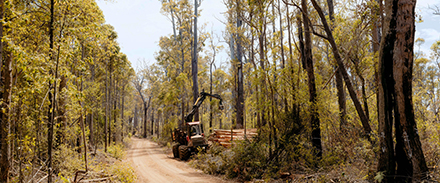As the Western Australian State Government’s ban on commercial production of jarrah and karri timber draws closer, the forestry industry is looking towards a restructured future to meet the community’s demand for timber and timber products. Source: Timberbiz
While the State Government’s decision to end native forestry does not align with State or Federal carbon targets or sustainable forest management objectives, according to Forest Industries Federation WA (FIFWA) Chief Executive Officer Adele Farina, the industry is firmly focused on the future.
“We have made it abundantly clear that we disagree with the State Government’s decision to end native forestry however, our industry is doing what it does best, and that’s focusing on meeting the ever-increasing demand for timber and timber products, albeit in an altered environment,” Ms Farina said.
“We face a restructured future, there is no doubt about that, but we remain passionate advocates for the active management of our forests and the expansion of the plantation industry.”
Under the State Government’s ban, no jarrah or karri will be commercially harvested under the new Forest Management Plan. At the same time, the state plantation area is declining.
According to government, some timber will still be available from mine site clearing and ecological thinning for forest health, but quantities are unknown.
Ms Farina acknowledged it had been a difficult period since 2021 as many businesses operating within the native forestry sector had to close their doors.
“It has been painful, there is no denying it,” Ms Farina said.
“We do not want that pain made worse by seeing our forests suffer as a result of neglect, which is why our ongoing objective remains as it was, to see healthy forests and sensible management, with timber sourced from sustainable management practices.
“For a low carbon future, ensuring we have an adequate supply of sustainably sourced local timber rather than increasing imports, is vital.”






